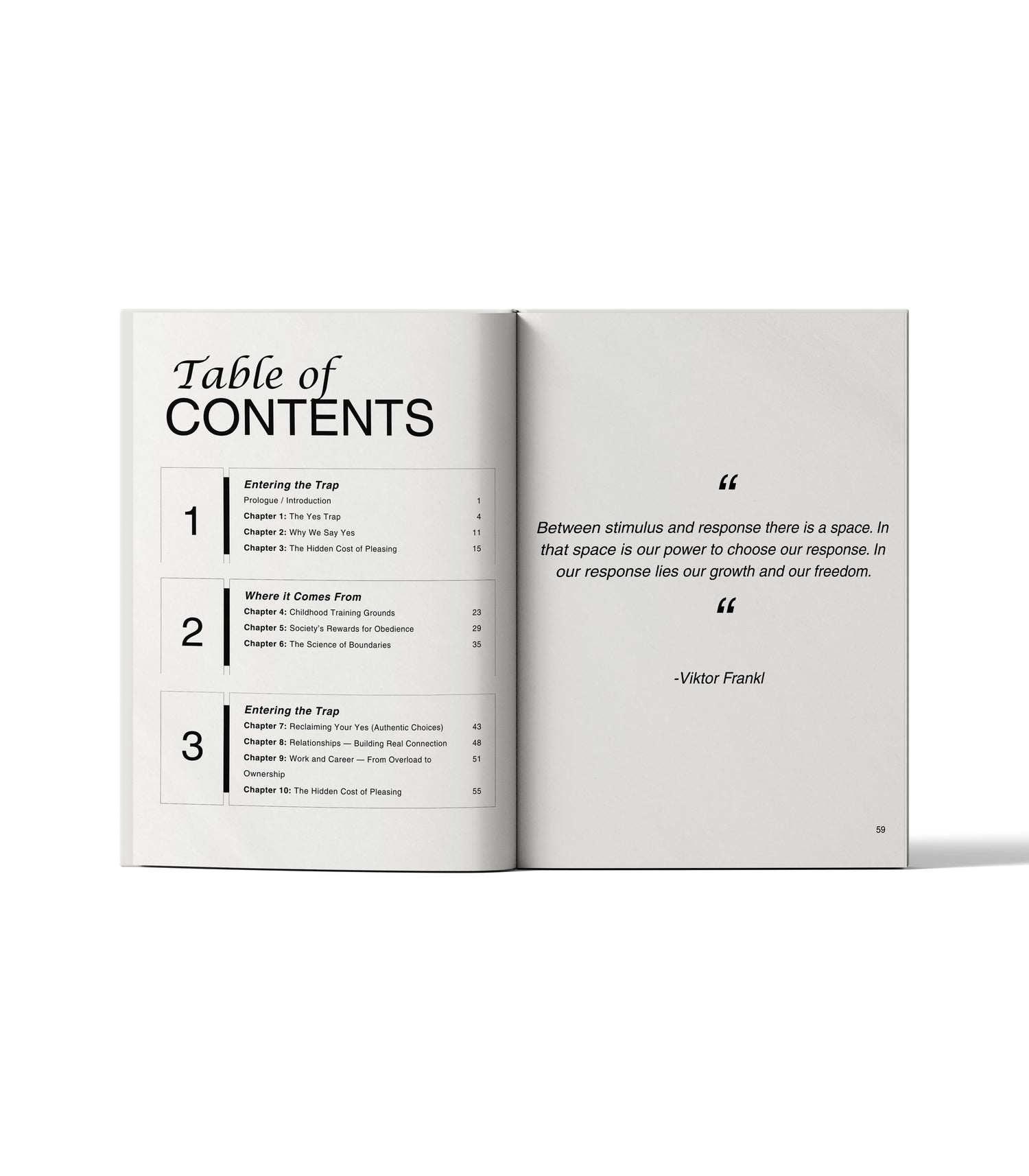
Let customers speak for us
from 6 reviewsShort, ruthless, and practical. The Yes Trap cut through my people-pleasing habits with simple audits and real scripts I could use immediately. I feel calmer and more in control after one week.

The book doesn’t promise a magic cure, but it gave me the push I needed to start making small changes. The bonus workbook was a nice surprise. Highly recommend if you’re burned out from trying to please everyone.

I always knew I said yes too much, but I didn’t realize how much it was costing me until this book spelled it out. I gave it 4 stars only because I wanted even more scripts/examples for saying no, but overall it’s excellent.

I expected another motivational pep talk, but the explanations are backed by psychology and it actually makes sense why I fall into people-pleasing. The reflection parts made me stop and think in a real way.

What I liked most is that it doesn’t drown you in jargon. It’s straight to the point but still deep. I kept nodding along like, yes, this is me.

I’ve read a lot of self-help, but this one hit me differently. The way it describes the guilt of saying no felt like it was written straight from my own life. I’ve already started practicing one boundary a week and I feel lighter.


The Yes Trap
Your ‘yes’ is currency. Spend it carelessly and you end up bankrupt—out of energy, peace, and self-respect. Spend it intentionally and you invest in a life built around your priorities instead of everyone else’s demands. This book helps you make every yes count and every no feel natural.
Reclaim Your Boundaries
The Yes Trap is a self-help ebook for anyone who feels drained by constant people-pleasing. Instead of living for approval, you’ll learn how to understand the roots of your “automatic yes,” uncover the hidden costs of pleasing everyone else, and begin reclaiming your time, energy, and identity. Clear, evidence-based, and relatable—this book is your guide to setting boundaries without guilt.
Voices That Echo These Pages

Voice 1
The Psychology Behind People Pleasing
Explains what people-pleasing behavior looks like, what drives it (fear of abandonment, emotional dependency), and what the mental health costs are.

Voice 2
Setting boundaries for your well-being
Discusses why boundaries are essential for emotional health, how poor boundaries raise anxiety and stress, and real life impact across work and relationships.

Voice 3
The Mental Health Implications of People-Pleasing
Validates people-pleasing as a measurable trait, links high people-pleasing scores with lower well-being and mental health challenges.
Stop Pleasing, Start Listening
Sign up now and get a free downloadable workbook with the key activities from The Yes Trap—plus bonus exercises not included in the book. Practical, simple, and ready to use right away. FOR FREE
FAQs
Is this book based on psychology or just personal opinion?
This book is grounded in psychology research, drawing from studies on people-pleasing, attachment, and boundary-setting, but it is written in plain language. While I add personal reflections and narrative to make it relatable, the core principles come from established psychological insights.
Do I need therapy in addition to reading this book?
Therapy is never a requirement, but it can be a powerful complement. This book can guide you toward awareness and practical change. If your people-pleasing is deeply rooted in trauma, anxiety, or relationships that feel unsafe, therapy provides the support and accountability that a book alone cannot.
Can teenagers read this, or is it for adults only?
Teenagers can benefit, especially those already struggling with peer pressure, overcommitment, or fear of rejection. The book is written for adults, but the lessons apply to anyone old enough to reflect on their behavior and relationships. Parents and teachers may even find it useful to discuss these ideas with younger readers.
How long will it take me to see results from applying the ideas?
That depends on your starting point and how consistently you practice. Some readers notice shifts in awareness after a few days—simply recognizing false yeses changes how you respond. Deeper changes, like guilt-free boundary-setting, often take weeks or months of practice. The Yes Trap is about rewiring habits, not quick fixes.
Is there a workbook or exercises included?
Yes. The book contains reflection prompts and practical exercises woven into the chapters. In addition, readers who sign up for the mailing list receive a free downloadable workbook with extra exercises to strengthen what you learn.
Does this book offer scripts or exact phrases to use when saying no?
Yes. While the focus is on mindset and self-worth, you’ll also find practical language examples—short, respectful ways to decline requests without apology or over-explaining.
Can I share the PDF with others, or do they need their own copy?
Each purchase is for individual use only. You may not redistribute or resell the PDF. If you’d like to recommend the book, please share the store link so friends and colleagues can grab their own copy. This keeps the project sustainable and supports future resources.
Does it work for workplace burnout, or is it just personal relationships?
Both. The Yes Trap applies to every area where false yeses appear: families, friendships, and workplaces. Many readers discover that their professional burnout is directly tied to the same people-pleasing habits they use in personal life.
What if my culture/family strongly expects obedience—will this book still apply?
Yes, though the challenge may feel greater. Some cultures and families place high value on deference, duty, or harmony. This book doesn’t dismiss those values, but it shows you how to balance them with self-respect. Boundaries look different across cultures, but the need for authenticity is universal.
How is this book different from other boundary/self-help books?
Those books are excellent resources, and I recommend them. The Yes Trap is narrower in focus—it zeroes in on the psychology and everyday reality of people-pleasing itself. Instead of covering every type of boundary issue, it traces the cycle of false yeses, explores their roots, and gives you a roadmap to reclaim your authentic voice. Think of it as a deep dive into one of the most common struggles readers face before they can practice boundaries well.
